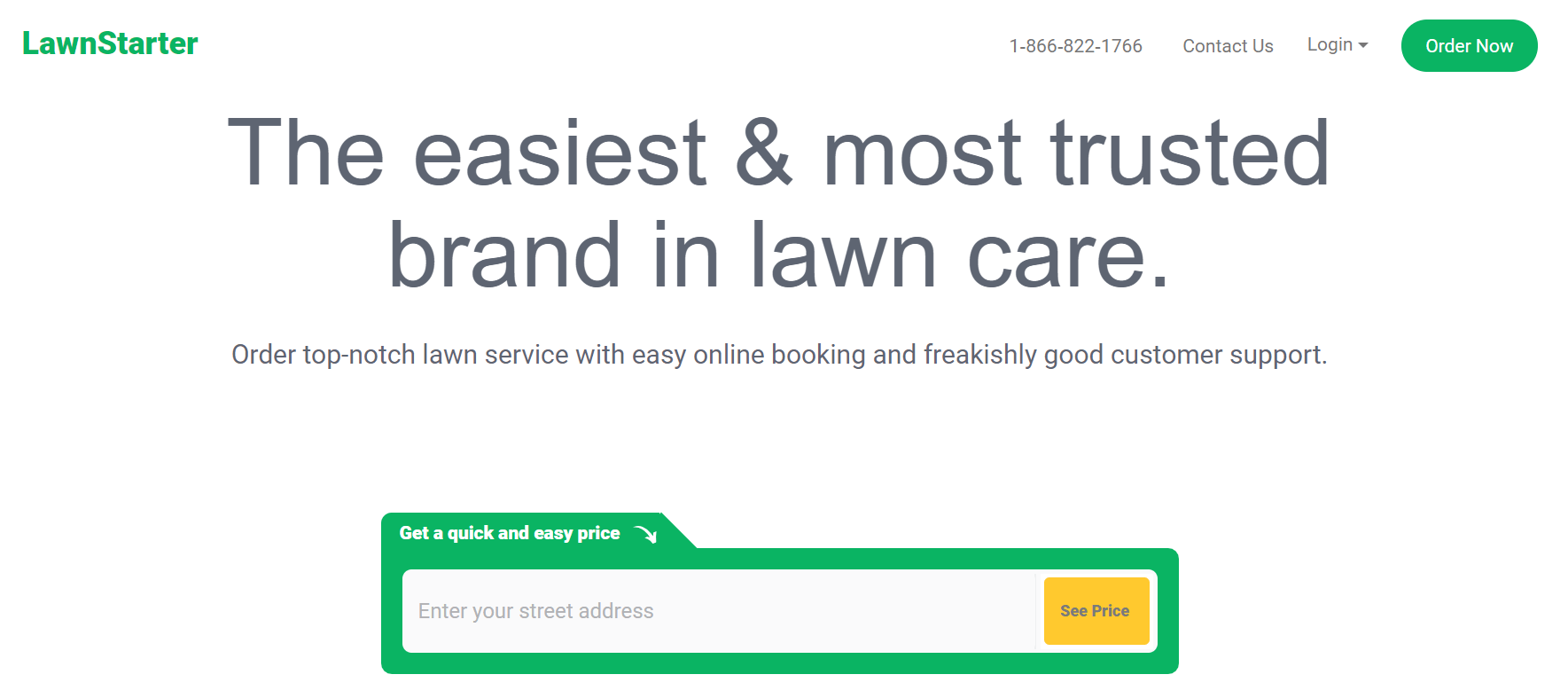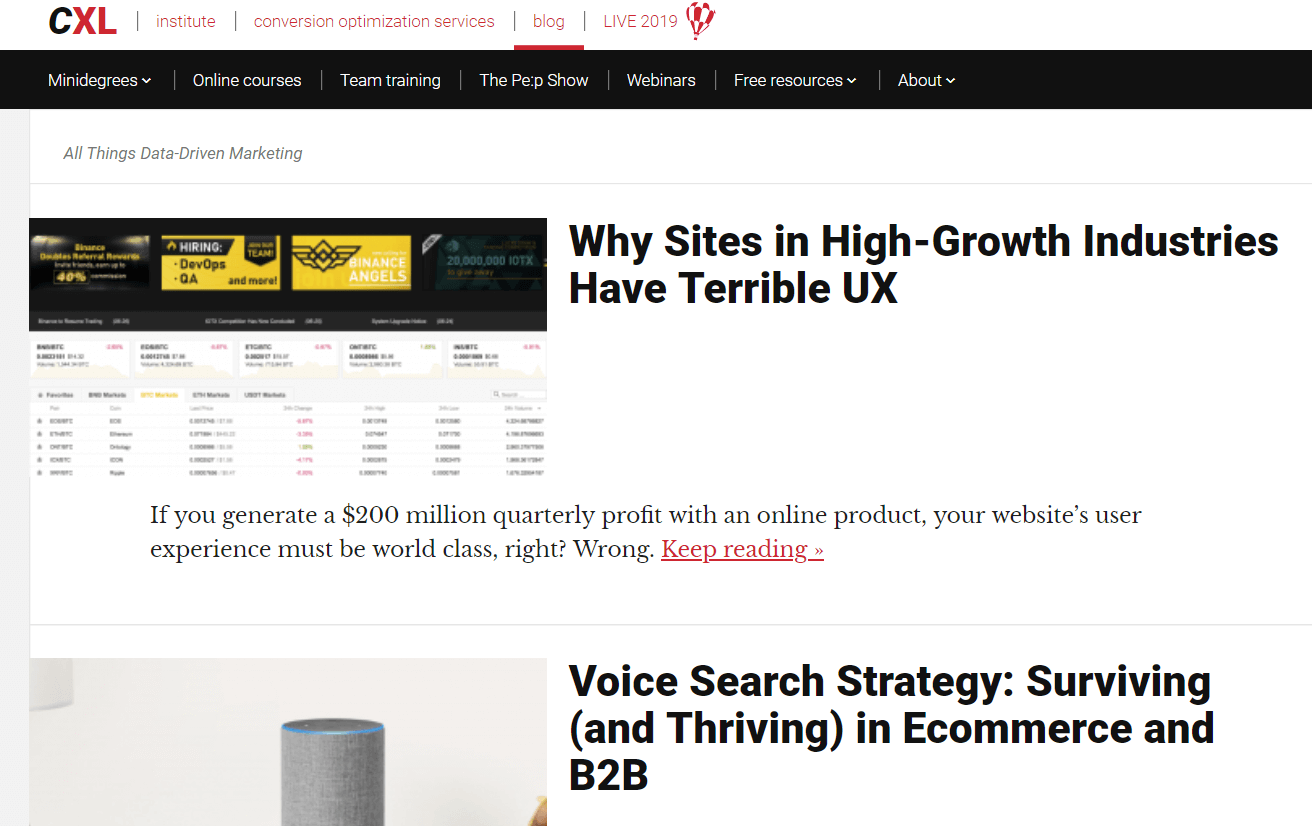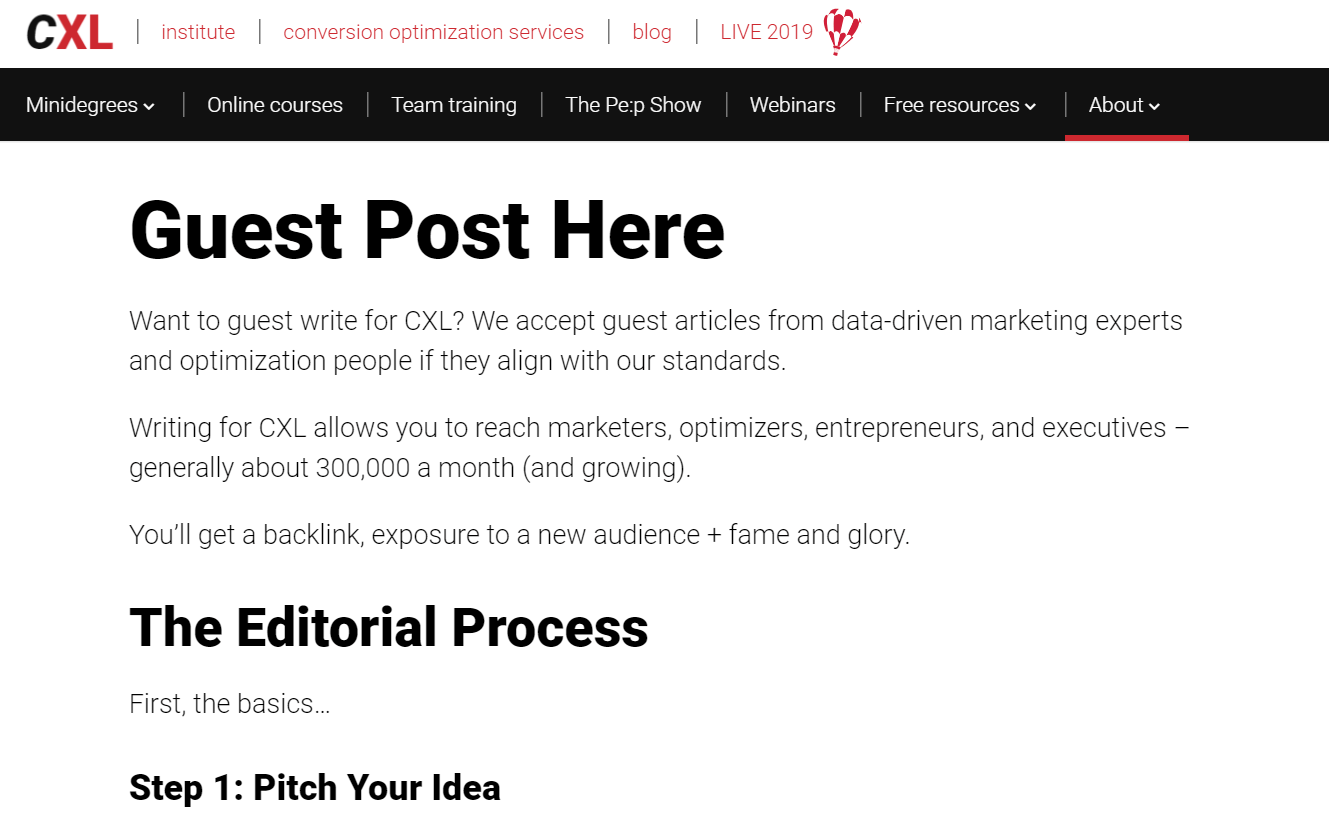Alex Birkett is HubSpot’s Senior Growth Marketing Manager, and he specializes in the area of user acquisition. Prior to his current stint at HubSpot, Alex worked as a Growth Marketing Manager in ConversionXL, where he grew ConversionXL’s blog to 3 million visits per year.
In this UpLead Growth Chat, we sat down with Alex Birkett to pick his brain on startups, user acquisition, and conversion techniques. To jump to specific segments of our interview, click on the relevant links in the table of contents up top.
Early career and personal growth
Will: On your LinkedIn profile, you mention that working at LawnStarter was like attending a “startup bootcamp”. What’s your most valuable takeaway from your stint there?

Alex: In the context of limited resources and greater than average uncertainty, you need to be scrappy and solve problems creatively. You can’t throw money at problems, build elaborate processes and systems, or hope to copy someone else’s playbook. You need to find an edge, somewhere you can compete with an outsized advantage.
I also learned that I genuinely love the early stage of a company, finding traction channels, and having my hand in a variety of tasks. However, on the other hand, it can be stressful. The work isn’t ever really over, and you can’t check out of work as easily. I still struggle with that because I’m a congenitally ambitious person, but at a large company, at least you know that if you take a week off the world won’t stop turning.
I also learned that eating the same Chipotle lunch every single day doesn’t actually get old. I can’t think of another restaurant or meal where that would be the case.
Will: Given your familiarity with the startup scene, have you ever thought of starting your own business? If you had the chance to do this, what sort of business would you create?
Alex: Yeah, but I like where I’m at right now, so it’s not urgent or stirring any cabin fever in me. I’ve had lots of wacky ideas, and some good ones, but didn’t think any were so worth pursuing that I’d leave what I was currently working on. If I were to create a business, it would have to be something around a problem I really care about solving, and something that I’m uniquely suited to solve. I’m not interested in starting a me-too SaaS tool or a dropshipping business.
Will: What’s the one biggest challenge that you’ve faced in your career so far?
Alex: Massive yet sporadic anxiety as to whether or not I’m working on the right thing or if I should be doing something else entirely or if I’m doing enough and keeping up with top performers. I mostly solve this with yoga, meditation, and many solid relationships and friendships.
Will: What did you study in school? Was this relevant to what you’re currently doing? If not, how did you gain the knowledge and skills required for your current position?

Alex: I dabbled in a few majors before choosing “Strategic Communications,” which is basically marketing communications, advertising, PR, etc. It’s housed in the Journalism and Mass Communications School at UW-Madison, so I took a few journalism classes as well. It’s mostly relevant, as I’m in a marketing role, but my marketing role is a lot heavier on the data and statistics side of things now.
Many of the case studies we worked on in school were unrealistic, things like allocating massive ad budgets for companies like Nike or doing public relations for Carnival Cruise lines. While interesting thought experiments, they weren’t necessarily practical.
Journalism classes were probably the most useful, as they helped me develop a clear writing voice (as opposed to the convoluted and annoying voice they encourage in English Lit classes – I’m not throwing rocks from afar, I was an English major for a few semesters too).
My favorite classes at school were “irrelevant” to what I do know – American history, European social history, Mathematics for Finance, and of course Human Sexuality. We did learn how to run controlled experiments and statistics in many of my mass media classes though. All in all, I’d say I gained the skills for what I do by being preternaturally curious and self-driven.
Growing ConversionXL’s blog to 3 million visits per year
Will: When you were at ConversionXL, how did you manage to grow the company’s blog so successfully?

Alex: It’s hard to attribute something honestly in hindsight that may have had many elements of luck or serendipity. But I think these things helped…
First, consistency.
In the several months before I started, publishing frequency was really sporadic, and even before that, it wasn’t generally very high. I started publishing twice per week, and then when Shanelle Mullin joined, we were publishing 4, or sometimes 5 times per week. This sounds so low in comparison with HubSpot or other big SaaS publications, but it takes an insanely long time to write a good CXL post. Our editorial strategy at Hubspot was:
“This piece has to be the best in the world, the last piece the reader should need to read on the topic.”
Next, high standards.
Peep Laja, who’s the founder of CXL has incredibly high standards for both editorial strategy and for everything in business. Excellence is an operational philosophy, and we weren’t allowed to put out bullshit. Every article was thoroughly researched and picked apart before publication.
The CXL community is passionate, so we’d engage with debate and comments as well. We didn’t put out “content,” we put out manuals that helped people set up CRO systems at their companies. Clearly, never wavering on our high standards helped CXL build rapport and trust with our blog readers over the years.
Last, content promotion.
Before I came in, there wasn’t much in terms of a formal content promotion process, so that was one of the first projects I took on. It wasn’t anything fancy, mostly just a checklist of things to do before, during, and after publication to help amplify the content – common stuff like email outreach, social and community, and working with industry experts to put out good content. Cumulatively, done on each blog post, I think this probably had a big effect.
I can’t share the actual checklist because it’s got a whole bunch of personal contact information on it, but I can tell you that it consists of various LinkedIn Groups, Slack channels, Facebook groups, influencers, and other communities. GrowthHackers and Inbound.org were on it. In any case, each individual row on the spreadsheet wasn’t overtly important, it was more the fact that we had systematized content promotion to the level that we’d just run through the checklist each time.
Will: Paraphrasing what you’ve said: the key is to focus on quality and quantity. Do you have any advice for new business owners who don’t have that much time to invest in content, and feel like they have to sacrifice one or the other?
Alex: Well, at CXL, we didn’t have a choice on quality – that had to be maintained. So the lever we could pull was really to increase the quantity, or the consistency with which we published.
There’s a limitation to how much a single human can produce. There’s a limitation to how much two humans can produce, as was the case with Shanelle and I. So in addition to maintaining a rabid, journalistic pace for our own publishing, we also turned up the dial on our guest posting. In this arena, I learnt a lot from Tommy Walker (previous editor of CXL).

Basically, I was doing two things simultaneously: building up a powerful network of expert practitioner I could call friends and collaborators, and building up a big database of content ideas. This was based in some part on SEO and search terms, but mostly out of customer questions and personal curiosity.
“I had a massive list of ideas and I would try to “assign” them to really great practitioners.”
The more guest posts I could assign to brilliant practitioners, the more I could focus on marketing strategy and other endeavors. But to actually answer your question, I think if business owners can’t invest a ton of time and resources into content, it’s highly unlikely it will work out for them.
“The space is too competitive, so it won’t work if you half ass it.”
If you want to dabble, though, go for quality. Morally, you’re better off putting valuable content out into the world (the world doesn’t need any more fluffy listicles or uncurated roundup posts). Strategically, there’s no way you can compete with content powerhouses on quantity. HubSpot, Mashable, Inc, etc. are going to beat you every time because they’ve got the domain authority and the team of writers to do it. You can only compete on massively better quality + link building if you’re a small or new player.
Will: What are some tools that you personally recommend for being trying to work on their content strategy?
Alex: I use Ahrefs and Google Analytics almost every day. When I was at CXL I used Buzzsumo quite a bit but haven’t used it in a while. I mostly just use a lot of spreadsheets.
Marketing and Conversion Rate Optimization (CRO) strategies
Will: What channels do HubSpot’s marketers rely on? Which channel has had the greatest ROI so far?
Alex: HubSpot has a massive marketing team that is working across many different channels, most of which I don’t have a hand in, so I can’t really talk about them. That said, it’s no secret that HubSpot is an organic search powerhouse. HubSpot coined the term “inbound marketing,” and I believe most of our leads and users come from content and search.
Will: You work on organic user acquisition, and that involves utilizing SEO strategies. What’s the one thing that most marketers or business owners get wrong about SEO?

Alex: I think the main thing with SEO tips, or any sort of marketing tips, is that you need to take them in context, especially if the advice given is from a first person perspective.
For example, Airbnb and Pinterest put out a lot of interesting papers on how they do experimentation, both for conversion optimization as well as SEO. If you’re running a one product ecommerce site with a low domain authority, though, their process of creating thousands of templatized landing pages probably isn’t going to do the trick for you.
Similarly, if you’re a small business is a competitive space, you’re going to have a hard time duplicating the success HubSpot has had using a content/editorial based SEO strategy. HubSpot has been doing it for years, has an impenetrable defense with their backlink profile, and has a big team of writers, editors, and strategists that is simply difficult to duplicate.
So in short, marketers and business owners can certainly read about what others are doing and take advice from others, but at the end of the day:
“The best thing you can do is think for yourself and find your own competitive edge.”
Here’s a fantastic article on how companies should approach SEO differently depending on the stage of their company.
Will: What’s one marketing strategy/tactic that you’ve tried, but gotten no success with?
Alex: At CXL, we couldn’t figure out how to make outbound sales work at all. They may have had more success since I left, but when I was there, we read lots of books, implemented SaaS sales best practices (SDRs, demos, etc.), and couldn’t really move the needle.
I’ve also tried tons of content and CRO experiments that have failed, but that’s just part of the process. They can’t all be winners.
Will: When these experiments fail, do you tweak your hypothesis and try again? How many times would you do this before you write it off completely, and move on to something else?

It’s not incredibly consistent, we tend to switch it up on a test-by-test basis. However, we always decide up front, before the test is set live, what the proposed action will be depending on a given result.
More specifically, before running an experiment, we draw up an Experiment Document. This includes a hypothesis and a follow up section; in the latter, we state what actions we will take depending on a given action. So if the experiment wins, we’ll roll it out to the full audience. If it loses, we’ll do what? And what if it’s inconclusive? We lay this out before we set the test live.
And in the case of our hypotheses, we may have a hundred different ideas of how we can test a single hypothesis. Obviously, we can’t test an infinite amount of iterations. So here’s what we do: we look at the hypothetical upside of moving the needle on this hypothesis and we weight it against the effort and resources we’ve put into it already.
If it seems like we’re stalling, and there are other interesting tests we could be running, we move on. If there is a big upside and we have enough data to believe, credibly, that there is something we can do to move the needle, we’ll take another swing.
Will: When it comes to CRO, there are plenty of case studies out there with contradictory results. (For example: some studies will tell you that green is the most effective color for CTA buttons, and others will tell you that red works better). What’s your take on this?
Alex: First off, I think CRO case studies, in general, are overrated and aren’t as helpful as they’re purported to be. They can be an interesting source of inspiration at times, at least in terms of surface level ideas. But as Peep Laja puts it,
“Knowing the results of other people’s A/B tests is as useful as knowing other people’s hot dog eating competition results.”
At least anecdotally, I’ve found that copying other ideas is often a good way to get inconclusive results and waste time and resources, as well as distracting efforts from solving known problems.
Second, I think CRO case studies are, in the vast majority of cases, inaccurate or misleading. Sure, there are some great examples of case studies that show all numbers and the tests were well run. But in the case of a green vs. red CTA button delivering a massive uplift? Question that data (see: Tywman’s Law).
My gripe with these simple, minimalist red vs. green button test case studies is that they really limit the scope and vision with which people view CRO. These studies inspire people to look at things tactically, showing that moving pieces around, shuffling papers basically, can bring in the big bucks. It’s rarely so simple.
“My advice is to put the blinders on, and stop reading other people’s case studies.”
These case studies are almost always published for self-serving purposes (like SEO or PR), so don’t take them too seriously, and just work on your own problems.
Lifehacks, sources of inspiration, and tips on relaxation
Will: What is your favorite lifehack?
Alex: I don’t know if I have any earth shattering life hacks, but if you have to listen to any amount of boring business podcasts, audiobooks, or YouTube videos, you can listen to 2x speed and still retain pretty much everything. This saves lots of time.

Another thing I find useful is to limit my phone use during social interactions, and give my full attention to the person I’m engaging. This is especially true if it’s a loved one, but it’s also true if it’s a stranger or acquaintance.
Try it for yourself – you’ll be happier for it, and they’ll definitely be happier for it. Everyone wins! The same goes for remote meetings – close your other tabs, turn your phone on Do Not Disturb, and just listen to the human on the other side of the screen.
Will: Which entrepreneur, leader or business owner inspires you the most?
Alex: I’m inspired by the people I know who manage to achieve great things while having strong integrity and good balance in life. Also, those who are generous, authentic, and share what they know – I can’t list them all obviously, but Peep Laja, Matt Gershoff, and Ronny Kohavi are three people who come to mind right away. I also admire a ton of my colleagues for similar reasons.
I’m trying to think of other famous inspirations, and I don’t want to be too obvious and say “Elon Musk,” though I have been inspired by him. I think, more than anything, I try to learn and absorb lessons from people of all levels of fame and success in any line of work, not just business.
For example, I like Leonardo da Vinci’s eccentric curiosity and attention to detail. I also like Lincoln’s pragmatism and foresight. It’s really hard for me to pinpoint one leader, like Steve Jobs or whatever, who embodies everything I like and am inspired by, so I take to take pieces from many sources.
Will: What business tool would you find it hard to live without?

Alex: Gmail, Excel, and Google Docs. And also, Loom! Loom is so awesome for a remote worker.
Will: If you had $100,000 to invest in one public company, what company would it be?
Alex: Probably Microsoft, but I don’t know.
Will: What do you do to destress and relax?
Alex: I do semi-hot yoga at Black Swan in Austin almost every night, play the guitar periodically throughout the day, walk the dog, and try to kayak at least once per week…
That’s what I’d love to say, but unfortunately, this is all still aspirational. The reality is that I don’t destress and relax very often, and almost all of my extra-curricular activities are some version of self-improvement or striving. Still working on that.








